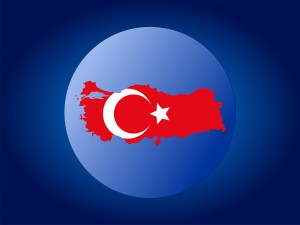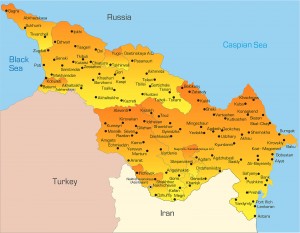10/26/2011 By Richard Weitz
One of the few points of division we encountered among Turkish government officials and analysts was their competing views regarding future political developments in Central Asia. One group believes that Central Asia was ripe for deep political change through its own version of the Arab Spring. They see the region as the last bastion of one-party authoritarian rule and considered the prospects for its near-term democratization to be high.

This first group would also welcome a phenomenon like the Arab Spring in the region since they consider the absence of functioning democracies in most Central Asian countries a significant problem for Turkish entities. For example, they note that, since all major policies in a dictatorship are determined by a single individual or group, authoritarian governments are prone to make radical changes in policy overnight. In addition, the constraints on most individuals’ ability to access information in authoritarian regimes as well as the legal arbitrariness common in non-democracies present major obstacles to domestic and foreign entrepreneurs seeking to run profitable businesses in these countries.
But another group of Turkish officials consider the prospects for Central Asia’s near-term democratization to be low because they were more optimistic about these regimes’ ability to withstand the kind of political chaos sweeping through the Arab world. They argue that it would take decades for these countries, whose leaders still consist of people who have overwhelmingly developed their political views during the Soviet period, to abandon their Soviet mentality and adopt Western liberal values.
In the view of these Turkish analysts and officials, another constraint on political change in Central Asia is the geographic isolation of these states from other democratic countries as well as their history of authoritarian rule. They argue that Central Asia’s democratization would entail a lengthy process requiring the further political and economic evolution of these countries. For example, they believe that these nations’ economic development would expand the size of their middle class. In time, these stronger middle classes could provide a foundation for these states’ evolution into more democratic regimes since people having some property want to exert influence on government policies that could affect these interests.
Conversely, this second group of Turkish officials fear that efforts to rush Central Asia’s democratization could easily backfire and lead their rulers to adopt even more repressive domestic politics. Instead, they advocate that, for the time being, Western governments focus on promoting the rule of law and human rights in Central Asia while hoping that economic development and other modernization trends would eventually lead to more democratic governments in the region.
At present, this second group of Turkish officials seems to have greater influence on Turkey’s policies toward Central Asia. But the onset of revolutionary upheavals in this region could easily shift the balance of influence in favor of the first group more eager and optimistic about the prospects for Central Asia’s democratization.
Despite their differences, both groups of Turkish officials maintain that their country could play at best a modest role in Central Asia. Neither thought Turkey sufficiently powerful to compete with Russia directly for regional influence. Turkish officials recognize Russia’s political, military, and economic primacy in Central Asia. They also perceive China as a growing economic power in the region. These officials see Turkey’s role in Central Asia mainly in cultural terms, encouraging these Turkic people to learn Turkish and acknowledge their historical affinity with the commonwealth of Turkish nations. They also want Turkish businesses to trade and invest in the region. In practice, the few Turkish companies having a major presence in Central Asia concentrate their activities in certain economic sectors such as construction.
During our visit to Ankara, we were fortunate to meet a wealthy Turkish entrepreneur who manages many investment projects in Turkmenistan. He confirmed that Turkmenistan does not offer foreign direct investors a welcoming environment. The country generally has inadequate infrastructure, pervasive corruption, low-skilled workers, political leaders and bureaucrats with an enduring Soviet mentality, and an authoritarian government. In theory, Turkmenistan could fulfill a large share of Turkey’s demands for imported natural gas. But in practice Turkmenistan officials have been content to sell their natural gas to just two primary customers—Russia and China. Russia sells some of the gas it imports from Turkmenistan to Turkey, but with a healthy markup.
Turkey has striven to develop cooperative programs with the independent states of the South Caucasus and Central Asia. Azerbaijan and several of the Central Asian republics have majority populations of ethnic Turkic origin and all have long engaged in trade and other relations with Turkey. Since these countries became independent in 1991, the Turkish government has sought to train and educate their people and provide technical, linguistic, and other assistance to their institutions, from their militaries and government agencies to their businesses and other non-governmental organizations. Turkish officials also see one of their missions as representing Central Asian interests and views within major international institutions such as the G-20. They therefore encourage Central Asians to convey messages to these institutions’ members via Turkey.
One researcher at an Ankara-based think tank estimated that more than 30,000 students from Central Asia and the South Caucasus have received some university education in Turkey since the countries of these regions had become independent in 1991. Nonetheless, he acknowledged that few of those receiving a Turkish education had risen above the status of mid-level managers or state bureaucrats upon their return to their home countries. In contrast, the number of university students from these countries who have received advanced education in Russia has soared since Putin became Russia’s leader in 2000 and made strengthening Moscow’s influence within the other former Soviet republics a priority. This trend has in turn reinforced the domination of the Soviet-era educated elite in these former Soviet republics and, in the view of this researcher, had made it harder for these nations to break with their Soviet mentalities.
The Turkey-Russia dynamic in the South Caucasus is also complex. For example, in the Armenia-Azerbaijan dispute over Nagorno-Karabakh and related issues, Moscow favors Armenia while Ankara backs Azerbaijan. That said, both Turkey and Russia are working to prevent renewed fighting between Azerbaijan and Armenia. The Russians would also like to see a reconciliation between Turkey and Armenia. Among other reasons, a rapprochement between Ankara and Yerevan could see an opening of their border, closed for almost two decades to most commercial activities.
Similarly, the Turkish government remains committed to support the 3,000-km Nabucco pipeline that would bring large volumes of natural gas from the Caspian Basin to Europe through Turkey while bypassing Russian territory. Nabucco is intended as a complement to the Baku-Tbilisi-Ceyhan oil pipeline, built in 2005, which circumvents Russian territory by bringing oil from Caspian fields to Europe through Azerbaijan, Georgia, and Turkey. Although the Turkish government remains committed to Nabucco, financial and other problems continue to impede its construction. Nabucco would be twice as long as Baku-Tbilisi-Ceyhan, cost three times as much (over $11 billion), and has not even begun construction despite being proposed in 2002. In any case, Turkey has sought to keep Nabucco from being seen as a threat in Moscow by inviting Russian energy firms to become key partners in the project
Even in the case of Georgia, Turkey has managed to maintain good relations with Tbilisi without antagonizing Moscow, though Turkish efforts to lessen Russia-Georgia antagonisms have largely failed.
Russia’s decision to use overwhelming force to defeat Georgia in its August 2008 war resulted in Turkish policy makers modifying their regional security policies. Moscow’s response shocked Turkish policy makers into realizing that their margin for maneuver in Russia’s backyard might be smaller than anticipated. To prevent further regional military conflicts, Ankara sought to advance a multilateral regional security framework that would both constrain Moscow’s assertive impulses as well as revitalize efforts to resolve the “frozen conflicts” among the former republics that, as shown by 2008 war, might unexpectedly thaw.
Although Turkish leaders had traditionally strongly supported Georgia’s territorial integrity and developed strong economic ties with Georgians, Turkish officials restrained their criticism of Moscow’s intervention and subsequent dismemberment of Georgia. Turkish representatives instead focused on averting future conflicts by promoting the creation of a Caucasus Stability and Cooperation Platform (CSCP) that would include Armenia, Azerbaijan, Georgia, and Russia as well as Turkey. The CSCP would supplement the contributions made by other regional security institutions, such as the Organization for Security and Cooperation in Europe (OSCE), also seeking to resolve the frozen conflicts.

Russian officials endorsed the proposed platform in principle since, by excluding non-regional actors, it would give Moscow and Ankara a leading role in addressing local security problems. The first meeting within the CSCP framework occurred on the sidelines of an OCSE meeting in Helsinki in early December 2008. Since then, the initiative has stagnated along with other efforts to engage Russia and Georgia within a common security framework. Additional weaknesses of the CSCP as a regional energy and security framework are that it excludes Iran and has been unable to overcome longstanding Azerbaijani-Armenian tensions.
Earlier this year Kazakh officials and the Russian press had discussed Turkey’s acquiring some kind of formal affiliation with the Shanghai Cooperation Organization (SCO), the dominant multinational institution in Central Asia. But thus far Turkey has not obtained even formal observer status in the SCO. Indeed, the Turkish diplomats we met disclaimed any interest in obtaining some kind of official status in the SCO. I remarked at several meetings in Turkey that some people in NATO might see Turkey’s affiliation with the SCO as helping to keep the organization from moving in an anti-Western direction by diluting Moscow’s and Beijing’s domination of the organization and adding another pro-Western state into its ranks. But my interlocutors seemed unenthusiastic about Turkey’s playing that role within the organization.
In general, one gets the impression that Turkey’s policy makers have concluded that they lack the capacity and resources to have a major independent impact in Central Asia given Russia’s longstanding political, economic, and cultural domination of the region. But they believe Turkey can exert some regional influence when it partners with Europe, the United States, Russia, or other more powerful actors. In the future, China and India might also serve as powerful partners if they continue to increase their economic presence in Central Asia.

